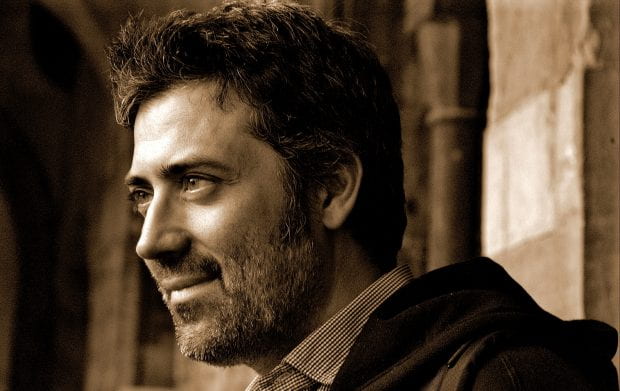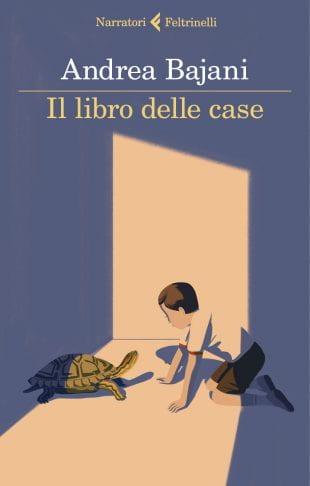Andrea Bajani has been thinking a lot lately about the journey a writer and reader take together, the evolution of character and the boundaries crossed in pursuit of something new. In fact, these intertwined ideas feature in three new books from the bestselling Italian novelist and poet, who is currently a writer-in-residence at Rice in the Department of Modern and Classical Literatures and Cultures.
“If You Kept a Record of Sins” (“Se consideri le colpe”) racked up the awards when it was first published in Bajani’s native Italian 13 years ago. The novel’s long-awaited English translation just received a starred review from Kirkus — a coveted honor that came months ahead of the book’s release date in March 2021.

Andrea Bajani is currently a writer-in-residence at Rice in the Department of Modern and Classical Literatures and Cultures, with three books coming out in the span of a few months.
“It’s not common, five months before the novel is out,” said Bajani, who was pleasantly surprised by the advance praise. When it comes to work translated for a foreign audience, he said, “You never know how a country will react, because there are always cultural differences.”
In the novel, translated by Elizabeth Harris and published in the U.S. by Archipelago Books, a man travels from Italy to Romania to settle the affairs of his recently deceased mother, who left their family when he was a teenager to pursue her dreams of success in the “Wild West” of the newly post-communist country. In Romania, he uncovers the complicated life of a woman who’d crossed a border in hopes of something better.
 Adding to advance praise for the book are blurbs from fellow novelists Jhumpa Lahiri (“Andrea Bajani’s haunting portrait of a mother-son relationship accumulates with the quiet urgency of a snowstorm. The impact is shattering, pure.”) and Colm Tóibín (“‘If You Kept a Record of Sins’ is written with grace and calm control. It deals with loss, especially the loss of a mother, with a chiseled sense of truth. Each image and each moment are captured with exquisite emotional accuracy.”)
Adding to advance praise for the book are blurbs from fellow novelists Jhumpa Lahiri (“Andrea Bajani’s haunting portrait of a mother-son relationship accumulates with the quiet urgency of a snowstorm. The impact is shattering, pure.”) and Colm Tóibín (“‘If You Kept a Record of Sins’ is written with grace and calm control. It deals with loss, especially the loss of a mother, with a chiseled sense of truth. Each image and each moment are captured with exquisite emotional accuracy.”)
“If You Kept a Record of Sins” will debut in America at the same time Bajani releases his latest novel in Italy: “Il libro delle case” (“The Book of Homes”) tells the story of a man, I, through the homes I has occupied from 1975 until the present. How these homes both produce and observe different versions of “I” over the years is a main theme.
“We are completely crazy when we are alone at home, and we do so many things that we wouldn’t show other people,” Bajani said. “The houses know that. All those secrets, our houses keep for themselves, meaning that every time you move, you lose and you abandon something of yourself in the house.”
 It’s not lost on Bajani that he will be doing two book tours next year as, in a sense, two versions of himself: One version from years past for a novel he wrote in 2007; one for a novel he wrote between 2015 and 2019, from a new home in a totally different country.
It’s not lost on Bajani that he will be doing two book tours next year as, in a sense, two versions of himself: One version from years past for a novel he wrote in 2007; one for a novel he wrote between 2015 and 2019, from a new home in a totally different country.
“I will be probably sitting in my apartment in Montrose doing my book tours in Italy and in the U.S., at very different hours of the day, being someone that I was a few years ago when I wrote ‘If You Kept a Record of Sins’ and being the one who wrote ‘The Book of Homes’ just now,” Bajani said. “It’s crazy to be different people.”
The protagonist of “The Book of Homes,” I, is a meditation on the self, which is also a theme of Bajani’s spring 2021 course, The Tell-All: Saying “I” in Contemporary Literature. What makes modern authors want to expose themselves to their audiences so deeply? And why do writers need readers in order to undertake that journey?
This relationship is also examined in Bajani’s third new volume, “Le storie che raccontiamo” (“The Stories We Tell”), in which he’s edited lectures from some of the world’s foremost novelists and writers: Jhumpa Lahiri, Colm Tóibín, Margaret Atwood, Zadie Smith, Michael Ondaatje and 11 others, all speaking to the bond between reader and writer.
The lectures were given over the span of 14 years at the annual Festival degli Scrittori, an international literary event in Florence that awards the prestigious Premio Gregor von Rezzori for the best work of foreign fiction.
 Bajani serves on the jury for the award and, for years, has learned something totally new — and something intensely human — about the writer who delivered each festival’s keynote lecture.
Bajani serves on the jury for the award and, for years, has learned something totally new — and something intensely human — about the writer who delivered each festival’s keynote lecture.
“These are the most important writers in the world, but a lecture is a moment in which you show yourself in your solitude, you are completely alone on stage, perhaps for the first time — without the help of fiction, without the help of a character,” Bajani said. “A lecture is a confession.”
People respond to lectures by writers, he said, “because it’s the place where the writers are the most human.” All of the lectures collected in “The Stories We Tell” feature famous writers with guards down, sharing moments both moving and funny.
For now, the lectures are only available in Italian, but Bajani said you never know when a translation of the collection might happen — after all, many of the lectures were originally written and delivered in English.
In the meantime, Bajani’s newest novel, “The Book of Homes,” has been purchased for publication worldwide, where it will soon be transcending borders of its own. That people are willing to invest money and energy and time to translate a story they loved so that others can enjoy it, he said, is profoundly rewarding for a storyteller.
“In the pandemic, where there are only empty airplanes crossing the ocean, it’s pretty moving that stories can still cross an ocean,” he said.

